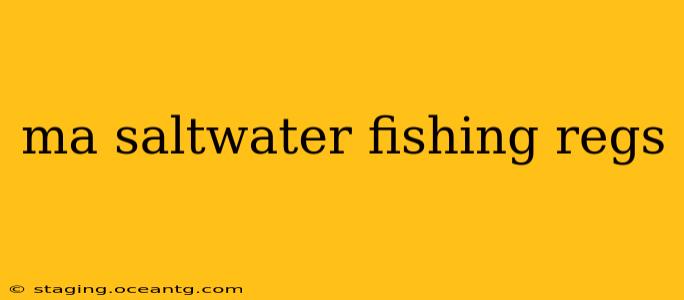Maine's saltwater fishing regulations are designed to protect the state's valuable marine resources and ensure sustainable fishing for future generations. Navigating these regulations can seem complex, so this guide will break down the key rules and regulations for saltwater fishing in Maine. Understanding these rules is crucial for responsible angling and avoiding penalties.
What are the main saltwater fishing licenses required in Maine?
Maine requires a saltwater fishing license for residents and non-residents aged 16 and older. There are different license types available, including daily, seasonal, and annual licenses. You can purchase these licenses online, at various license vendors throughout the state, or at some sporting goods stores. Remember to check the Maine Department of Marine Resources (DMR) website for the most up-to-date pricing and information. Failure to possess a valid license when fishing in saltwater is a violation.
What are the size and bag limits for popular saltwater species in Maine?
Size and bag limits vary significantly depending on the species and the time of year. For example, the daily bag limit for striped bass might be different during the spring spawning season compared to the fall. Specific limits are detailed on the DMR website and are subject to change. It’s crucial to consult the official regulations before you go fishing, as violating size or bag limits can result in hefty fines. Always measure your fish carefully before keeping it, and be mindful of the specific regulations for each species you target. Popular species like cod, haddock, flounder, and lobster all have specific size and bag limits that change seasonally.
What are the gear restrictions for saltwater fishing in Maine?
Maine regulates the type of fishing gear allowed in certain areas and for specific species. For instance, there may be restrictions on the use of certain types of traps or nets, particularly in areas designated as protected habitats. These gear restrictions are implemented to minimize bycatch and protect vulnerable marine life. Always check the DMR regulations for specifics on allowed gear, as using prohibited gear can lead to legal repercussions.
Are there any specific areas or seasons closed to saltwater fishing in Maine?
Yes, there are seasonal closures in specific areas to protect spawning fish or other sensitive marine ecosystems. These closures may affect access to popular fishing grounds during certain times of year. Maine’s coastline has many diverse habitats including estuaries and rocky shores, which may have different regulations. The DMR website provides detailed maps and descriptions of closed areas, including the dates when these restrictions are in effect.
How can I report a violation of saltwater fishing regulations in Maine?
The Maine DMR encourages anglers to report any observed violations of saltwater fishing regulations. Reporting suspected violations helps protect marine resources and ensures fair fishing practices. You can report violations through the DMR’s website or by contacting their enforcement division directly. Reporting is crucial to maintaining responsible fishing practices and preventing overfishing.
Where can I find the most up-to-date Maine saltwater fishing regulations?
The most reliable source for up-to-date information on Maine’s saltwater fishing regulations is the official website of the Maine Department of Marine Resources (DMR). This website provides detailed regulations, maps of closed areas, and contact information for any questions or concerns. Regularly checking the DMR website is highly recommended, as regulations can change throughout the year.
Disclaimer: This information is for guidance only and should not be considered legal advice. Always refer to the official Maine Department of Marine Resources website for the most current and accurate saltwater fishing regulations. Failure to comply with regulations can result in fines and other penalties.
